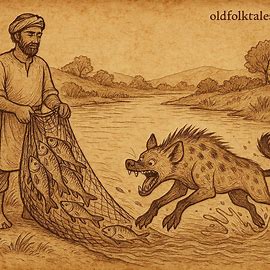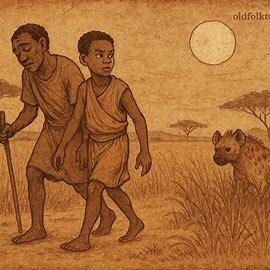long ago, during the dry season, the people of a village gathered to burn the prairie. Men and women worked together: the men hunted game in the open grasslands, while the women dug for dixinji-rats hidden in the earth. When the day’s work ended, the villagers returned home with their spoils, except for one young woman who lingered, still digging. Her name was Samba.
As she worked alone, a Di-kishi, one of the feared spirit-beings of the Ma-kishi, came upon her. He gazed at her and said, “You please me, little woman.” Samba trembled, for she knew the Ma-kishi were man-eaters.
The Di-kishi asked her name. “I am Samba,” she replied. He smiled. “Come, let us go home. With whom did you come?”
Samba, her voice shaking, sang a song in reply:
We dug crickets — in plantation;
We dug crickets — in plantation.
The others caught ten — in plantation;
I caught one — in plantation.
In plantation! — in plantation!
The Di-kishi laughed, delighted by her song. “It pleases me,” he said. “Come, let us go home.” And so, he took her away.
When the villagers noticed Samba missing, they whispered, “Samba is lost.”
At the Ma-kishi village, the Di-kishi proudly introduced her. “I have brought a girl who sings a good little song.” The others urged, “Let her sing it again.” Samba obeyed, and the Ma-kishi laughed with approval.
For a time, Samba lived among them. Yet soon the other Ma-kishi pressed her captor: “Let us eat her. One day she will run away.” But the Di-kishi refused. “I will not. I will marry her.”
He built her a house, and in time, Samba bore him three sons: Ngunda, Kadingu, and little Papa.
Years passed. One day the Ma-kishi plotted again, this time against her children. “Tomorrow we will eat one child,” they conspired. The boys overheard and ran to their mother in fear.
At dawn, Samba feigned illness. “I am too sick to hoe the fields,” she told her husband. He agreed: “Stay. I will find you again at day’s end.” The villagers went to work, leaving behind only children.
Seizing her chance, Samba gathered her belongings and seeds. She sent Ngunda and Kadingu ahead, carrying Papa on her back. Together they fled.
Soon, the Ma-kishi children informed her husband: “Samba has run away.” He rushed home, but she was gone. He followed her path, catching sight of her in the distance. Calling out, he sang:
Me leave Ngunda;
Kadingu, go with him.
Me leave Ngunda;
Kadingu, go with him.
Samba sang back:
Ngunda is a child;
Kadingu is a child.
Papa, Ngunda,
Kadingu, let us go.
To delay him, she dropped a cracked calabash full of millet. When the Di-kishi reached it, he stopped, singing as he picked up the grains:
Pick, pick up! A fruit, don’t waste it.
Pick, pick up! A fruit, don’t waste it.
By the time the millet was gone, Samba was farther away.
Again, he pursued, again he sang, and again Samba answered. She threw down a calabash of sesamum seeds. He paused once more, chanting as he picked them up. Then came another pursuit, another exchange of songs, and another offering, this time Eleusine grain.
Finally, Samba and her children reached a great river. With effort, she carried them across. When the Di-kishi arrived, the waters swelled and blocked his path. He could not cross.
Exhausted but safe, Samba returned to her people. The villagers rejoiced: “Samba has come! We thought she was dead. Where have you been?”
She told them, “A Di-kishi carried me away. With him I bore three sons: Ngunda, Kadingu, and Papa. But I escaped.” Her family welcomed her warmly, slaughtering a goat in her honor.
Back among the Ma-kishi, her husband returned empty-handed. The others mocked him. “We warned you: let us eat her, for one day she will run away. You refused, and now your wife is gone with your children.” He answered bitterly, “What shall I do?”
And so, the tale ends.
Moral of the Story
This folktale teaches that courage and wisdom can overcome even the most dangerous circumstances. Samba, though powerless before the Ma-kishi, relied on patience, cleverness, and a mother’s love to save her children. The story also reminds us that cruelty and greed, no matter how strong, eventually collapse against the power of resilience and truth.
Knowledge Check
1. Who was Samba, and what happened to her in the prairie?
Samba was a young woman left behind while digging for a dixinji-rat; she was captured by a Di-kishi.
2. Why did the Di-kishi spare Samba when the others wanted to eat her?
He was charmed by her song and chose to marry her instead of allowing her to be killed.
3. What were the names of Samba’s children?
Her three sons were Ngunda, Kadingu, and Papa.
4. How did Samba delay her husband during the chase?
She threw down calabashes of millet, sesamum, and Eleusine, which he stopped to gather.
5. What stopped the Di-kishi from catching Samba and her children?
A great river swelled, preventing him from crossing.
6. From which culture does this folktale originate?
It is a traditional folktale of the Kimbundu people of Angola.
Source: Kimbundu folktale, Angola.







